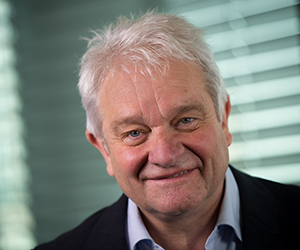Paul Nurse

An innovative thinker and bold investigator, Paul Nurse has made crucial discoveries regarding the mechanisms that regulate cell replication, a process fundamental to all life forms. He has also been a highly effective leader and community builder in global science.
Born in Norwich and raised in Wembley, northwest London, Dr. Nurse was the first of his family to remain at school after 15 years of age. From his early childhood, Dr. Nurse was intensely curious about the natural world. His academic interests and aptitude stood out, but he gained admittance to university only after the chair of the genetics department at the University of Birmingham recognized his promise and waived the foreign language entrance requirement, thus circumventing his inability to pass a mandatory French exam.
After receiving his bachelor’s degree, Dr. Nurse earned a Ph.D. at the University of East Anglia. For his postdoctoral work, he joined Murdoch Mitchison’s lab at the University of Edinburgh followed by a senior fellowship at the University of Sussex. Dr. Nurse then went on to faculty positions at the Imperial Cancer Research Fund and Oxford University. By elegant genetic studies in yeast, he identified genes that regulate the orchestrated progression through the cell cycle, ensuring that key steps in cell growth, DNA replication, and preparation for chromosome segregation are achieved before the initiation of cell division. He went on to show that the same processes that regulates the cell cycle in yeast are also used by human cells, revealing the universality of cell cycle regulation among eukaryotes.
Dr. Nurse has also been a leader of the academic community. He served as director of the Imperial Cancer Research Fund and founded Cancer Research UK. He has also served as President of The Rockefeller University and of The Royal Society, the oldest science academy in the world. Most recently, he founded The Francis Crick Institute, which he continues to direct. Dr. Nurse’s leadership has been characterized by creativity and bold vision, along with deep regard for the value of all individuals to the success of an institution, a quality that promotes strong communities.
In 2001, Dr. Nurse was awarded the Nobel Prize in Physiology or Medicine, he has also received the Albert Lasker Basic Medical Research Award and the Copley Medal of the Royal Society, among numerous other accolades. He was knighted by HRH The Queen in 1999, received France’s Legion d’Honneur in 2002, and received the Japanese Order of the Rising Sun in 2018. He is presently a Chief Scientific Advisor of the European Commission.